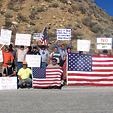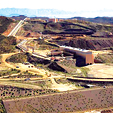Legislation & Regulation
PLP Update
August 2018 by Scott Harn
Since my last trip to Washington, DC, in June, the communication lines have remained open with several federal agencies and key members of Congress.
While we were unable to get our proposed “Small Miner Amendments,” written by Clark Pearson of Public Lands for the People (PLP), through this cycle of the National Defense Authorization Act (NDAA), we had in-depth conversations with members of both the House and Senate. Several influential members like our proposals and are still working with us to refine them. Now that large mining concerns were successful in getting a strategic and critical minerals section added to the NDAA to address some of the major issues facing large mining companies, the NDAA pathway is open for the next cycle. And the current administration’s goal of reducing regulatory burdens is backstopping this effort.
Some of these influential members are continuing to ask for our opinions on matters currently under consideration that will affect small miners.
While in DC, Clark and I participated in a full-day roundtable discussion with other concerned property rights advocates on topics such as ranching, logging, mining, off-road use, critical habitat and other public land uses. As I write this, I just finished participating in a conference call regarding the Endangered Species Act (ESA) with members of the US Fish & Wildlife Service and the National Oceanic and Atmospheric Administration. These two agencies jointly announced a much-touted proposal to “streamline” the process for Section 7 consultations, and to further define and clarify “some of the standards under which listings, delistings, and reclassifications, and critical habitat designations are made.”
From what I heard and read, their proposed changes do little to fix the major issues like the proliferation of critical habitat and the designation of habitat even in areas where a species is no longer present. Critical habitat is what shuts down mining, ranching and logging, and locks up federal lands. However, there was one bright spot—the Service proposes to remove the “blanket rule” put in place by the Obama Administration that automatically conveyed the same protections for threatened species as endangered species.
The proposed changes from Fish and Wildlife and the NOAA will be published in the Federal Register July 25 and can be found online at www.regulations.gov. There will be three separate notices, and we encourage all miners to review the proposed changes and submit comments. The current administration has shown a stronger inclination than past administrations to accept constructive comments and reduce regulatory burdens, but those changes won’t come unless you participate in the process. Comments will be accepted for 60 days after publication and can be made via the website: www.regulations.gov
Where the agencies are falling short, Congress seems to be stepping in to take control of ESA problems.
The House is currently focussed on fixing the ESA by limiting the never-ending litigation and by placing reasonable limits on how and why a species is listed as threatened or endangered.
The goal of the ESA needs to be refined and directed back toward its original intent, which is to recover species or remove them from the list if extinct. Since it was initially signed into law in 1966, amended in 1969, and completely replaced with a new version in 1973, the ESA has become an unwieldy beast that was hijacked by government agencies run amok, and by extreme environmental groups who saw it as a way to lock up public lands and to generate income through exaggerated claims and continuous lawsuits.
The House wants to fix many of these issues and return the focus to recovery. The House has proposed 9 bills so far to address ESA problems; you can view them online at www.govtrack.us.
If you haven’t had the opportunity to review the “Small Miner Amendments” you can find them with a quick search on our website at www.icmj.com. We also published a survey last month on page 28 of the July 2018 issue asking you, our readers, what our priorities should be when seeking relief from Congress, and I want to thank those of you who have already sent those in.
While we obviously would have loved to have at least a portion of our “Small Miner Amendments” through Congress by now, we have to be realistic. It took large mining concerns six years to get their proposed bill through Congress and we’ve only been at it for three years. We’ve learned that patience and persistence is key, and we’re determined to keep at it until we see real relief for small miners in America.
Clark Pearson of PLP and I have offered to return to DC for further discussions with some of these key members of Congress to work face-to-face on the “Small Miner Amendments,” and we will likely return later this year as funding allows.
I also want to take this opportunity to thank all of our loyal advertisers and readers. I’ve made three week-long trips to DC in the past 15 months with Public Lands for the People. It’s your continued support that allows me the opportunity to travel to DC and seek relief for small-scale miners. And thank you for your continued support of PLP—this would be impossible without their expertise.
The Perfect Response
In May, 2016, the Andersons received a letter from Steve Niemela at the Oregon Department of Fish and Wildlife requesting access to their property to conduct surveys for “foothill yellow-legged frogs and other amphibians.”
Feinstein Pushes for Million-Acre Land Grab
 Met by jeers and cheers from more than 1,000 people, US Senator Diane Feinstein (D-CA) made another pitch to create three new national monuments in the deserts of southern California recently.
Met by jeers and cheers from more than 1,000 people, US Senator Diane Feinstein (D-CA) made another pitch to create three new national monuments in the deserts of southern California recently.
Legislative and Regulatory Update
• Refunds coming to Nevada claimholders
• More wilderness proposed
• Forest Service planning rule
Disturbing Trend: Federal Judges Disregard Mining Laws
 Recently, a left-leaning Arizona federal judge, James Soto, who is an Obama appointee, shut down a proposed copper mining project for the flimsiest of reasons. He basically disregarded and rewrote federal mining law.
Recently, a left-leaning Arizona federal judge, James Soto, who is an Obama appointee, shut down a proposed copper mining project for the flimsiest of reasons. He basically disregarded and rewrote federal mining law.
Legislative and Regulatory Update
• Pendley nomination withdrawn but will remain BLM director for now
• Comments needed for Midas Gold project in Idaho
It's Time to Get the Heck Out of China
 We are at a crossroads; either we establish the mining, production and refining of rare earth elements here in the US or we remain subjected to the whims of the Chinese government.
We are at a crossroads; either we establish the mining, production and refining of rare earth elements here in the US or we remain subjected to the whims of the Chinese government.
EPA Reopens Comments on Pebble Project
The settlement did not grant an immediate approval for the project, but it did begin to clear the way for the company to apply for federal permits—a path the Obama administration previously had thwarted.
Subscription Required:
The Bawl Mill
• Legislative and Regulatory Update
• Ask The Experts - What are these thin brittle sheets with reddish powder?
• Ask The Experts - Are custom mills available for titanium and tungsten?
• Ask The Experts - What assay value is needed for cobalt deposits?
• Ask The Experts - What do you think is the source of gold in this area of Ireland?
• Annual Claim Filings Due
• Highbanking for Gold
• Gold Placers in Italy
• Critical Minerals: Titanium—Part II
• Detector Brings New Life to An Old Lode Mine
• The Batteries Metal Rush
• Blackberries and Gold
• Writing It All Off After The Tax Cuts and Jobs Act
• Melman on Gold & Silver
• Mining Stock Quotes and Mineral & Metal Prices








